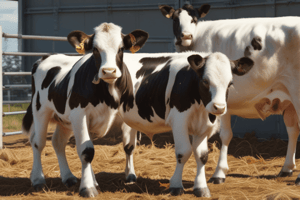Podcast
Questions and Answers
Which of the following is a general guideline for feeding rate adjustment?
Which of the following is a general guideline for feeding rate adjustment?
- Slow down the feeding rate if the patient cannot tolerate an increased rate (correct)
- Increase the feeding rate regardless of the patient's tolerance
- Increase the feeding rate until the person adapts
- Start with a high feeding rate and gradually decrease it
What is the recommended starting rate for intermittent feedings?
What is the recommended starting rate for intermittent feedings?
- 10-40 ml/hour
- 60-120 ml/feeding (correct)
- 30-40 ml/feeding
- 60-120 ml/hour
How often should the feeding volume be increased for intermittent feedings?
How often should the feeding volume be increased for intermittent feedings?
- Every 4 to 6 hours
- Every 8 to 12 hours (correct)
- Every 12 to 24 hours
- Every 6 to 8 hours
What is the recommended starting rate for continuous feedings?
What is the recommended starting rate for continuous feedings?
How often should the feeding rate be increased for continuous feedings?
How often should the feeding rate be increased for continuous feedings?
When should feedings be withheld and evaluated?
When should feedings be withheld and evaluated?
What may be recommended if the GRV is persistently high?
What may be recommended if the GRV is persistently high?
How much water is needed per kilogram of body weight daily?
How much water is needed per kilogram of body weight daily?
What is the water content in formulas?
What is the water content in formulas?
When should additional water be provided to patients?
When should additional water be provided to patients?
What is one potential cause of diarrhea in patients receiving tube feedings?
What is one potential cause of diarrhea in patients receiving tube feedings?
What is one potential cause of constipation in patients receiving tube feedings?
What is one potential cause of constipation in patients receiving tube feedings?
What is one potential risk factor for aspiration during tube feedings?
What is one potential risk factor for aspiration during tube feedings?
What are some potential complications associated with transnasal routes for tube feedings?
What are some potential complications associated with transnasal routes for tube feedings?
What are some potential metabolic complications associated with tube feedings?
What are some potential metabolic complications associated with tube feedings?
What should health practitioners monitor to detect problems before complications develop during tube feedings?
What should health practitioners monitor to detect problems before complications develop during tube feedings?
What is one recommendation for transitioning to table foods after tube feedings?
What is one recommendation for transitioning to table foods after tube feedings?
What can be done if a patient has not consumed lactose for several weeks during tube feedings?
What can be done if a patient has not consumed lactose for several weeks during tube feedings?
What should oral intake supply before discontinuing tube feedings completely?
What should oral intake supply before discontinuing tube feedings completely?
What is one potential complication that can be prevented by choosing the appropriate feeding route, formula, and delivery method during tube feedings?
What is one potential complication that can be prevented by choosing the appropriate feeding route, formula, and delivery method during tube feedings?
Which of the following can cause diarrhea in patients receiving tube feedings?
Which of the following can cause diarrhea in patients receiving tube feedings?
What can increase the risk of aspiration during tube feedings?
What can increase the risk of aspiration during tube feedings?
Which of the following is a mechanical complication associated with feeding tubes?
Which of the following is a mechanical complication associated with feeding tubes?
What can cause constipation in patients receiving tube feedings?
What can cause constipation in patients receiving tube feedings?
What is a potential diet-drug interaction that must be considered during tube feedings?
What is a potential diet-drug interaction that must be considered during tube feedings?
Why are continuous feedings usually stopped before and after medication administration?
Why are continuous feedings usually stopped before and after medication administration?
What can cause leakages of GI secretions in ostomy patients receiving tube feedings?
What can cause leakages of GI secretions in ostomy patients receiving tube feedings?
Which of the following is a metabolic complication associated with tube feedings?
Which of the following is a metabolic complication associated with tube feedings?
What should be monitored to detect problems before complications develop during tube feedings?
What should be monitored to detect problems before complications develop during tube feedings?
What should be done after a patient's condition improves during tube feedings?
What should be done after a patient's condition improves during tube feedings?
Flashcards are hidden until you start studying




